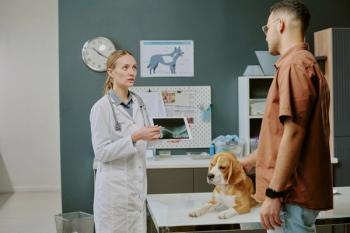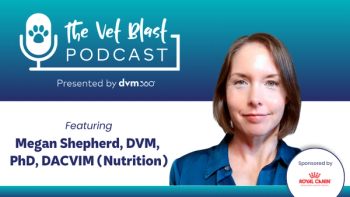
Spotlight on Generic Drugs: Comparing generic, brand-name, and compounded drugs (Sponsored by Putney)
Providing high-quality yet affordable patient care is a goal for veterinarians, especially with today's economy. Generic drugs are an attractive option with attributes of both affordability and quality.
Providing high-quality yet affordable patient care is a goal for veterinarians, especially with today's economy. The cost of treating pets often plays a large part in how clients perceive the value of their veterinary care.1 Generic drugs are an attractive option with attributes of both affordability and quality; however, these drugs can raise questions about how their efficacy and safety compare with that of their brand-name counterparts. The fact is both brand-name and generic drugs, whether they are intended for human or veterinary use, undergo a stringent approval process overseen by the U.S. Food and Drug Administration (FDA).
What's the difference between brand-name and generic drugs?
A brand-name (pioneer) drug is sold and manufactured under a trademarked name by a pharmaceutical company that holds the drug patent. These drugs include prescription products that undergo many extensive clinical efficacy and safety tests and are often backed by large marketing campaigns, all of which contribute to their higher costs.
Myth Busters: Correcting misconceptions about generic drugs
In anticipation of a drug company's patent and marketing rights expiring for a pioneer drug, other drug companies may begin an application and review process with the FDA to manufacture a generic formulation of the drug. The FDA review process for generic drugs is similar to the review process for brand-name drugs (Table 1). However, generic drug companies are not required to repeat clinical efficacy and safety studies since these have already been conducted for the pioneer drug. Instead, generic drug manufacturers must demonstrate that their product is bioequivalent — that the generic drug delivers the same amount of active ingredient to the site of action as the pioneer drug and produces the same physiological results.
Table 1: Brand-name vs. Generic vs. Compounded Veterinary Drugs
Like their brand-name counterparts, generic drugs must be manufactured in accordance with current Good Manufacturing Practices (cGMP) in order to receive FDA approval. The manufacturing facilities for generic and pioneer drugs can be domestic or overseas and, as with pioneer drugs, generic drug manufacturing facilities must be inspected and accepted by the FDA. The generic drug company must also demonstrate that their product has the same strength, purity, and quality as that of the pioneer drug. Stability data must be provided for generic drugs to ensure that the drug has the intended shelf-life with no loss of potency.
By showing that the generic drug is bioequivalent to the pioneer drug, it's expected that the risk of side effects for the generic drug is comparable to that of the pioneer drug. As with brand-name drugs, the FDA continues to monitor reporting of adverse drug reactions for generic drugs once they are on the market.
What does bioequivalent mean?
A generic drug is bioequivalent to a brand-name drug if there is no significant difference in the rate and extent to which the active ingredient becomes available at the site of action when given at the same dose and by the same route.2
Figure 1. The results of a bioequivalence study showing plasma concentrations of Putneyâs veterinary-approved cefpodoxime proxetil and Simplicef® (cefpodoxime proxetil; Pfizer Animal Health) in fasting dogs (n = 40) after 100-mg dose administered orally. (Data on file at Putney.)
Drug manufacturers demonstrate bioequivalence through rigorously designed scientific studies in healthy animals, which determine the following:
- Rate of absorption — the maximum plasma concentration of the active ingredient (Cmax)
- Extent of exposure — area under the plasma concentration vs. time curve (AUC) for the active ingredient (determined through serial plasma drug measurements)
These data for the generic drug are then compared with data for the pioneer drug (see example in Figure 1).3
There has been some misunderstanding in the general public that the FDA does not require that concentrations of active ingredient in the blood for generic drugs be comparable to those for brandname drugs. This is simply not the case. A recent FDA review of bioequivalence data for human drugs from over a 12-year period compared the absorption of brand-name and generic drugs in the body. This review analyzed 2,070 bioequivalence studies and found that the average difference in rate and extent of absorption between the two was less than 5%.4 Whether it's a generic human or veterinary drug, bioequivalence studies ensure that generic drugs are therapeutically equivalent to their brand-name counterparts.
Important Safety Information
What's the difference between compounded and generic drugs?
In veterinary medicine, compounded preparations are often used to address the unique and specific needs of a patient whether by changing dosage strength, changing formulation (e.g., pills to liquid), or adding flavoring to facilitate administration. It is important to note, however, that compounded preparations and generic drugs are not the same. Though compounded drugs must be prepared from FDA-approved drugs (and not from bulk or raw active ingredients), these preparations do not have FDA approval or oversight. Compounded preparations, unlike generic drugs, have not undergone the testing needed to establish bioequivalence; 5 therefore, the safety and the efficacy of the compounded drug are not confirmed. Compounding pharmacies are not regulated by the FDA in the same way traditional drug manufacturers are, and this lack of oversight can have a negative effect on both human and veterinary patients. Reports in late 2012 of human patients contracting fungal meningitis from tainted compounded preparations have raised valid concerns about the safety of these products.
Articles and reports about human compounded drugs have highlighted concerns about consistency between batches of compounded products.6,7 The United States Pharmacopeial Convention (USP) is a nonprofit group that has established drug standards to ensure strength, quality, purity, and consistency. According to the International Academy of Compounding Pharmacists, adherence to USP guidelines is expected from all compounding pharmacies8; however, only 17 states require adherence to these standards.9
Similar concerns about consistency of compounded preparations have been raised in veterinary literature.10,11 In a 2012 study, researchers found wide variability in insulin concentrations as well as inconsistent pH levels across a range of compounded PZI insulin products. The researchers noted that "FDA-mandated quality control testing works to detect manufacturing and stability problems in FDA-approved products and helps to assure that such products are in adherence with FDA and USP specifications. No similar system is in place to monitor the quality of compounded products."11
Excipients used in compounded drugs may pose additional risk. While these pharmacologically inert substances are intended to increase drug solubility/delivery and improve shelf-life, excipients in compounded drugs can adversely affect the therapeutic response or can themselves cause adverse reactions.12 Excipients in FDA-approved drugs are regulated by the FDA; however, their use in compounded formulations is not and may result in altered pharmacokinetics that impact the safety and effectiveness profile of the active ingredients. Unfortunately in many scenarios, compounding undermines the protections and purpose of the FDA approval process, and a veterinarian's professional liability insurance may not cover allegations of negligence resulting from compounded drug use.13
The benefits of generic drugs
Recent economic hardships have dramatically increased pet owners' concerns about veterinary costs.1 By offering competitively priced medications and increasing affordable treatment options, veterinarians can have a significant impact on pet health and client satisfaction. Putney produces safe, effective, FDA-approved veterinary generic drugs that can help veterinarians continue to offer high-quality patient care. Given that 80% of human prescriptions are filled with generic medications,14 pet owners can appreciate the use of generic medications for their pets' care if they know these drugs are safe and effective.15
Along with a commitment to product safety and efficacy for pet medicines, Putney provides the same level of expert veterinary technical support that brand-name drug manufacturers offer. Putney generic drugs allow veterinarians to provide more affordable treatment options to clients without compromising their patients' health and safety.
REFERENCES
1. Volk JO, Felsted KE, Thomas JG, et al. Executive summary of the Bayer Veterinary Care Usage Study. J Am Vet Med Assoc 2011;238(10):1275-1282.
2.
3.
4. Davit BM, Nwakama PE, Buehler GJ, et al. Comparing generic and innovator drugs: a review of 12 years of bioequivalence data from the United States Food and Drug Administration. Ann Pharmacother 2009;43(10):1583-1597.
5.
6. Weiss RA, Voigts R, Howell DJ. Absence of concentration congruity in six compounded polidocanol samples obtained for leg sclerotherapy. Dermatol Surg 2011;37(6):812-815.
7. Chollet JL, Jozwiakowski MJ. Quality investigation of hydroxyprogesterone caproate active pharmaceutical ingredient and injection. Drug Dev Ind Pharm 2012;38(5):540-549. Epub 2012 Feb 13.
8.
9. Douglass K, Kastango ES, Cantor, P. The 2012 USP <797> Compliance Survey: Measuring Progress. Clean Rooms & Compounding 2012;9(10):4.
10. Cook AK, Nieuwoudt CD, Longhofer SL. Pharmaceutical evaluation of compounded trilostane products. J Am Anim Hosp Assoc 2012;48(4):228-233.
11. Scott-Moncrieff JC, Moore GE, Coe J, et al. Characteristics of commercially manufactured and compounded protamine zinc insulin. J Am Vet Med Assoc 2012;240(5):600-605.
12.
13.
14.
15.
A practice owner's perspective by Gary Block, DVM, MS, DACVIM
With economic pressures increasing on veterinarians as well as our clients, use of generic drugs makes sense on many levels. Because these drugs are FDA-approved and bioequivalent to their name-brand versions, I never worry about a generic drug's efficacy. With known pharmacokinetic and pharmacodynamic profiles, FDA-approved generic drugs can be used interchangeably with their more expensive name-brand versions. Veterinarians should remember that generic drugs are produced in FDA-inspected facilities, and they cannot be offered for sale without approval by the Center for Veterinary Medicine (CVM).
Although I do use compounded medications on occasion, there is increasing evidence that some treatment failures in animals receiving compounded drugs are probably due to variable production methods and potency.1-3
The distinction between compounded and generic medications must be recognized, as compounded medications can suffer from stability and purity issues.1-3 Using a compounded medication instead of a generic drug to try to save money may end up costing more in the long run by providing subtherapeutic or inconsistent drug concentrations that result in suboptimal patient response.
As a small-animal internist, I see many patients that have chronic conditions that often require weeks, months, and even years of therapy. Before certain generic drugs became available, I was often faced with a client who could not afford to treat his or her pet appropriately or who was forced to switch to a less effective therapy to save money. Though both scenarios were better for the client's budget, they were often worse for my patient.
Since many of our clients are struggling to afford veterinary care, stocking your practice pharmacy with generic alternatives will save these clients money while helping your pharmacy maintain revenue. Having immediate access to these medications is good for treating hospitalized patients and for dispensing to clients to promptly start pets on therapy.
We are all aware of the efforts of big-box pharmacies to siphon business away from small-business veterinary practitioners. Generic drugs help level the playing field, allowing veterinarians to better compete with these stores. The convenience of dispensing these medications on the spot is often the difference between a client spending money in your hospital versus going to a pharmacy staffed by pharmacists who may know little to nothing about veterinary pharmacology.
REFERENCES
1. Boothe D. Veterinary compounding in small animals: a clinical pharmacologist's perspective. Vet Clin North Am Small Anim Pract 2006;36(5):1129-1173, viii.
2. Cook AK, Nieuwoudt, CD, Longhofer, SL. Pharmaceutical evaluation of compounded trilostane products. J Am Anim Hosp Assoc 2012;48(4)228-233.
3.
Gary Block, DVM, MS, DACVIM
Dr. Block earned his veterinary degree at the New York State College of Veterinary Medicine at Cornell University in 1991 and completed an internship at the Angell Memorial Animal Hospital in Boston the following year. After his residency training in internal medicine at Purdue University, he became board-certified by the American College of Veterinary Internal Medicine in 1994. Dr. Block earned a master's degree in 1997 from the Center for Animals and Public Policy at Tufts University. Along with his wife, Dr. Justine Johnson, he is founder and co-owner of Ocean State Veterinary Specialists, a 37-doctor referral and emergency hospital in East Greenwich, R.I.
Dr. Gary Block
Newsletter
From exam room tips to practice management insights, get trusted veterinary news delivered straight to your inbox—subscribe to dvm360.




